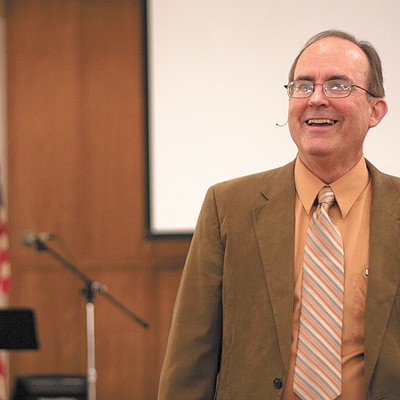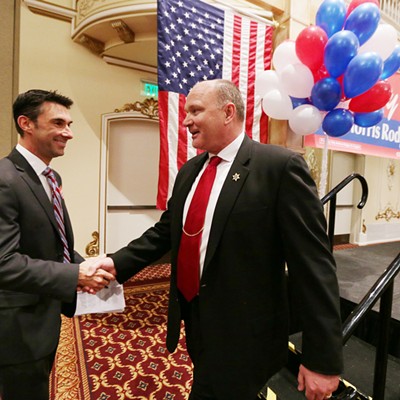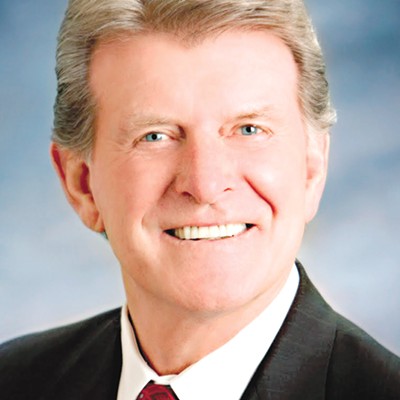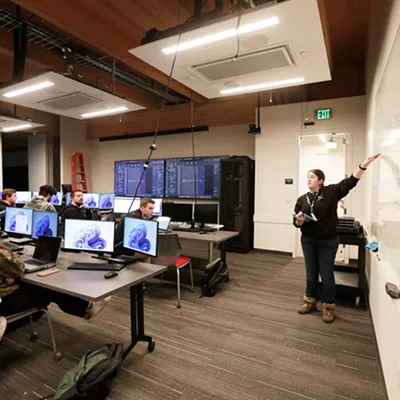Since his first race for the state House in 2008, Rep. Kevin Parker says he's personally knocked on more than 50,000 doors, asking constituents for their vote — not that he needed to. Parker ran for his second and third terms unopposed. This time, the Republican incumbent and Dutch Brothers franchise owner has a Democratic challenger on the ballot: Donald Dover, a retired technology administrator at Washington State University, who threw his hat into the ring when no other candidate came forward.
Dover's top priority is ensuring that the state fulfills its constitutional obligation by adequately funding K-12 schools; his second is creating a transportation package that meets the needs of Eastern Washington. Like Dover, Parker's first concern is drafting a budget that prioritizes K-12 education. He's also working on a jobs package that would help entrepreneurs thrive and young people pursue internships. In the legislature, Parker is known for his work championing legislation to combat human trafficking. He has also sponsored successful bills aimed at helping the homeless find work, and saving manufacturing and retail jobs.
Candidate Q&A
If elected, what will you work to accomplish in the Legislature next session?
Kevin Parker (Republican): One is I want to see a budget that continues to address K-12 appropriations first. Since 2009 I've sponsored several bills that said we will sponsor education first. I’m also working on a jobs package that emphasizes entrepreneurship start-ups and internships. … I’m working on that; I’m working on the transportation issue — the North-South corridor — and then continuing to work on crime and human trafficking
Donald Dover (Democrat): The first thing that needs to be addressed is complying with our mandate of the state constitution. Putting off our children again and putting off funding of our children’s education is really not acceptable. Then our next priority should be creating a well-funded transportation package here in Eastern Washington. It’s time to get that taken care of.
The Legislature is obligated under the state Supreme Court to fully fund K-12 education by 2018. How can the Legislature keep good on this promise while facing a projected budget shortfall? Would you support any plans for increasing the state’s revenue?
Parker (R): We have $2.8 billion more coming in. We're not hurting for revenue in that regard. We’d like to be higher but that's 8.3 percent revenue growth. And that’s coming from the [Office of Financial Management] and state chief economist, and those are fairly healthy numbers given where we are, at least healthier than where they have been. Since ’09, I have been an advocate for funding education first, and I do want to see that education is funded first and fully, but so now it becomes our responsibility to compose a funding plan that is both practical and transparent about costs and academic performance without shifting the costs of basic education to local school districts.
Dover (D): We in Washington — all of us — are going to have to find a way to pick up more revenue, or we aren’t going to be able to afford all of our services. As much as I hate to say it, we need to consider an income tax.
Without additional sources of revenue, state agencies will be forced to cut funding to balance the 2015-17 budget. In your opinion, which programs and services can afford these budget reductions? On the other hand, which programs and services would you strive to protect from these cuts?
Parker (R): I would protect K-12 and I would protect higher ed and public safety. Those would be my priorities for protecting in dollars, as well as programs for the truly most needy. … One of the things I did was pass a budget proviso with the help of the governor’s office that says instead of giving us 40 pages, [government agencies] have to put everything into a draft of one page and five columns, and that will make it much more transparent, so it’s very clear. Now by law, on that graph, they have to list what they're asking for and how much money they're asking for and when they’ll need a upgrade again. So that’s going to help stop some of that siphoning of public dollars that agencies have been doing.
Dover (D): I can’t think of very many Washington state government programs that are so large and overfunded they can take a lot of cuts. It’s going to be tough to find places that can use those cuts without causing real pain to real people. I’d rather see tax exemptions cut from big businesses. … Now that we've expanded Medicaid and health care as part of the Affordable Care Act, I think it would be a real disservice to pull the rug out from under some of those citizens and have those programs cut after only two years.
Would you support Gov. Inslee’s proposed carbon emissions tax and/or cap-and-trade system? If not, what, if anything, should Washington do to cut greenhouse gas emissions in order meet the carbon-emissions reduction targets set by the Legislature in 2008?
Parker (R): No. I do not support what Gov. Inslee is trying to do. I think it’s a huge miscalculation on his part. In recent years, he should know we have already cut emissions substantially. In fact, vehicle emissions are at an all-time low; as well, car manufacturers design for efficiency. Emissions in the oil and gas sector are down 12 percent in the past three years as companies are embracing technology.
Dover (D): I agree with Gov. Inslee’s proposals to treat our environment with respect. We need to wean ourselves from fuels that pollute and encourage the use of cleaner fuels. So this policy should extend more to our personal transportation and home heating needs, and not just pollution caused by manufacturing.
As Washington faces a looming doctor shortage, Washington State University is asking the Legislature for $2.5 million to establish its own medical school. Would you support this request from WSU? If not, what’s your plan for filling this growing need in our health care industry?
Parker (R): Yes, very much so. When we look at the doc shortage, it’s pretty significant and I feel people across the state recognize that as well. I would have liked to see WSU and [University of Washington] work out their differences. I’m disappointed they have not, but in lieu of that, I do support the $2.5 million request.
Dover (D): Supporting the health-care needs of our citizens is going to require Washington to not only train but recruit and retain medical professionals. … We need to find a way to get those that we train to stay in our communities and serve our state needs. I support WSU’s request for more training money and building a WSU school of medicine, but I would also like to see more funds set aside for retention.
As the recreational marijuana industry continues to grow, what reforms would you support to the medical and/or recreational markets?
Parker (R): We’re hearing a lot of complaints from young families that are concerned for their health and safety since their neighbors have obtained permission to produce and process. I’m certainly open to amending the RCW to only allow producer-processor operations in commercial versus residential areas, to protect those neighborhoods from illicit activity from the new industry.
Dover (D): I’m going to plead ignorance here. Quite frankly, I don't have a good handle on how to regulate medical or recreational marijuana. … I just want to make sure we regulate it as well as we have our liquor industries.
After accepting $8.7 billion in tax breaks, Boeing recently announced it will move 2,000 jobs to Oklahoma City and St. Louis. What incentives should Washington offer to big businesses to keep them from moving jobs out of state?
Parker (R): One, we need to look at the Silicon Valley area. I think we would be wise to provide the very best STEM education to grow the most talented workforce as possible around the country. This will allow for a productive business environment and one in which the Boeing subcontractors can flourish.
Dover (D): This is tough. Right now we have so much of our tax structure based on our sales tax and B & O taxes that Boeing and Microsoft and others have not been paying their fair share by asking for exemptions. ... I would quite frankly like to see a huge reform in our tax structure, possibly to the point of eliminating the B & O tax and possibly the state sales tax, and eventually replacing it with with a more progressive state income tax.
Here at the Inlander, we’ve written extensively about the cracks in our mental health system. Our stories have touched on the burden of mental illness on the criminal justice system, punitive conditions at Eastern State Hospital, psychiatric boarding, and the difficulty of getting care in rural areas. What specific steps would you support to improve mental health care in Washington?
Parker (R): We have an opportunity in the next legislative session to provide some meaningful solutions. My office has been vigilant on this issue with House Appropriations. We’re working with existing hospitals and off-site residential locations to plan for capacity for the mentally ill. … I think we're making a lot of strides toward mental health. It’s not cheap, but it is important, and I feel not only is the Legislature starting to realize that this is a bipartisan issue, but I think people in our communities realize that this is at the root of a lot of struggles in our society.
Dover (D): I just don't think our Spokane County Jail should be the main point of mental health care for people in this county who are doing criminal acts and have mental health problems. It’s very unfortunate that the biggest provider of mental health services has been our jail. … We’d be much better off combining the investments we’ve made in our WSU medicine program and adding in training for psychologists, psychiatrists and other mental health programs.
























